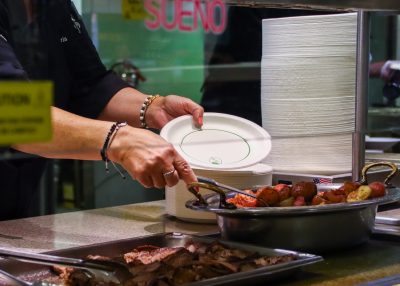
The Fresh Food Company at Warren Towers Dining Hall has been using paper plates and plastic cutlery for the past several days instead of its regular dishes and silverwares.
This recent change at the Warren Dining Hall was caused by a broken dishwasher, according to Boston University spokesperson Colin Riley.
“Change to paper and plastic all had to do with the dish machine being out of order and a part (of) that supply chain issues affected (the dishwasher),” he said. “Soon as that part comes in, the machine will be fixed and we’ll be back to the flatware utensils.”
The change in Warren Towers dining hall using disposables raised concerns they might have an impact on the environment, as the dining hall is one of the largest on-campus food places in BU.
Riley said 3,000 to 4,000 meals are eaten at Warren Dining Hall, as the hall houses almost 1,800 students.
Jericho Jacala, a freshman in the College of Engineering who eats about three times a day in the Warren Dining Hall, said although it didn’t change the experience of eating in the dining hall, the change raises concerns about the environment.
“I can’t imagine how it’s much better for the environment,” Jacala said. “It ends up in a landfill somewhere and then that eventually seeps off into the environment,” Jacala said.
Some students like Alp Gelgen, a freshman in ENG, said they were experiencing inconvenience in terms of the sizes of the non-reusable bowls and dishes.
“It’s just made it more inconvenient for certain portion sizes,” Gelgen said. “For example, for the previous hard bowl, I’d only get one, but now I have to get two of the small cups.”
Regarding the situation, William Chen, a freshman in the College of Fine Arts who eats at Warren once a day, expressed confusion since there was no notification about the change.
“I’m a little confused as to why they changed it,” he said. “They didn’t send a newsletter or anything talking about it.”
Chen said “the change hasn’t affected him from eating in the dining hall.
“I personally don’t have much of a change,” he said. “It hasn’t stopped me from being able to eat food, so I think I’m good.”
Charles McGinn, a senior in ENG and the president of the BU CleanTech Club, said he thinks the dining hall is using biodegradable items which makes it better — if disposed of properly — than using petroleum products.
“As far as I know, a lot of the utensils and the plates and bowls are biodegradable,” McGinn said. “Certain items that are like paper products can be biodegradable in the sense that they will eventually degrade down in the dirt and not cause too many problems for the ecosystem.”
However, he added it’s still worse than using normal dishes and plates that are reused after being washed in Warren dining hall’s own system.
“They get to control where that waste ends up so as far as the biodegradable stuff goes, I assume that it would go with the rest of the food waste,” McGinn said. “The ideal would probably be that we don’t have any disposable items, we just use things that can be washed.”
Riley wrote that the environmental impact is less than it appears.
“Dining Services works closely with CERO (the compost cooperative for BU),” he wrote in an email. “Dining Services sent the waste paper products used in Warren Towers Dining Hall over the past week to CERO and not to a landfill.”
This article has been updated to reflect additional information from BU Spokesperson Colin Riley.
























































































































Michael Scully • Oct 22, 2022 at 9:53 pm
Some pathetic “environmental” pseudo-sensitive jargon from the mouths of the young. Hey, the machine broke down. Circumstances required a concession. Deal with it.
We’ll done, BU food service.
Michael Scully,
CAS (CLA) ‘77